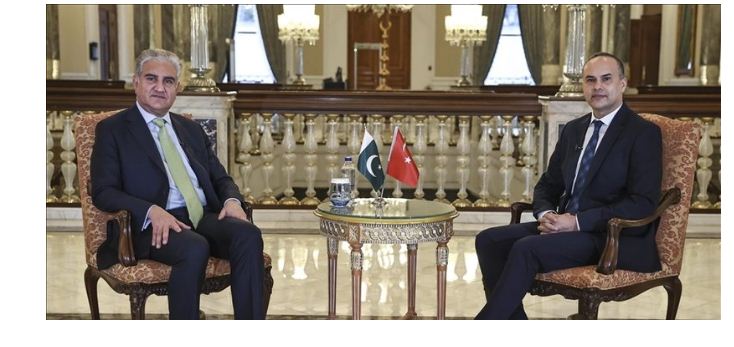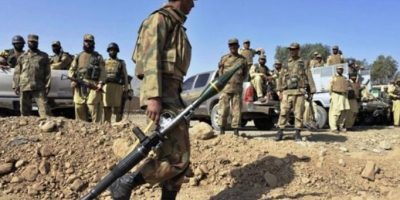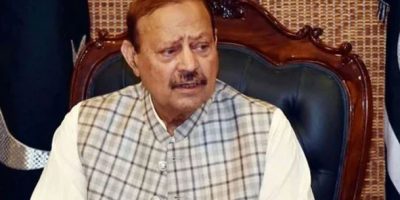Stakes ‘very high’ in Afghan peace process: Pakistan’s foreign minister

ANKARA, APR 25 – With a “golden opportunity” for peace there which must be seized, Pakistan’s Foreign Minister Shah Mahmood Qureshi said the stakes are “very high” in Afghan peace process.
“The stakes are very high. If there’s progress, there can be peace, there can be stability, and the region collectively will benefit from the outcome of a peace process,” Qureshi said during an exclusive interview with Anadolu Agency.
Qureshi underlined the fear for a civil war in Afghanistan, which is the last thing anyone wants, if there is no agreement and political settlement.
The process which started in Doha, Qatar, should come to a logical conclusion through the Istanbul conference, the minister stressed.
The foreign minister also talked about the “growing” Pakistan – Turkey defense cooperation, saying that two countries can have joint ventures, transfer of technologies.
Qureshi has twice served as foreign minister between 2008-2011 and currently, since August 2018. In an interview with Anadolu Agency, he discusses challenges and opportunities.
Afghan peace process
Q: Mr. Foreign Minister, thank you very much for your time and welcome to Istanbul, you have met with the Turkish foreign minister and Afghan foreign minister for trilateral meetings. So, we know that we are very close to a deal, maybe at least the conference to find a solution, a permanent solution for Afghanistan. In which process right now are we? What are the stakes? And do you think we are close to any settlements soon?
Qureshi: The stakes are very high. If there’s progress, there can be peace, there can be stability, and the region collectively will benefit from the outcome of a peace process. And everybody would reap the dividends of peace. The stakes are high, simply for the reason that God forbid, if there is no agreement, if there is no political settlement, the fear of going back into the 90s, the fear of Afghanistan going into a civil war is looming over our heads. And that is the last thing anyone of us wants. And that is the last thing Pakistan wants because Pakistan has paid a huge price because of the unstable environment in Afghanistan. We have paid a huge human price, and we’ve paid a huge economic price. That is why we feel a stable, peaceful Afghanistan is in Pakistan’s national interest.
Q: When we think about the geopolitical competition, Pakistan and Afghanistan sit on the heart of maybe when we think about the Chinese Belt and Road Initiative, American and Russian interests, they’re also regional powers, as you have mentioned, do you think these conflicting interests can help, or it can make it worse? How would you evaluate from a geopolitical point of view?
Qureshi: Pakistan’s geopolitical location is significant. And we feel Pakistan can take advantage of that situation for generating economic activity and this Economic Corridor that has been built between China and Pakistan, the hub of economic activity. We feel with the completion of this flagship project, Pakistan is providing a huge opportunity to landlocked countries like Afghanistan and the Central Asian republics. Look at the advantage they have the shortest route to warm waters to a port, and it will multiply trading activities. You will have warehouses, you will have employment generation, and we are developing special economic zones along the Economic Corridor. So, we think this regional competitive environment can be converted to our mutual advantage. And we want to create a win-win situation so that everybody gains from it. You know, China gains from it, Russia gains from it, Central Asian republics gain from it, and the entire region benefits from this, and it’s not confined to just the region. Anyone, Western countries, United States, European Union, anyone who’s interested in coming and investing in these areas, we will welcome that. So, this competition can be converted into a mutually advantageous position.
Q: What about the US withdrawal? Do you think this will help the situation and all the parties understand what you have mentioned the interests for everyone, the stability?
Qureshi: Well, the US has finally taken a decision. As you know, the last administration had announced a withdrawal, and they have given a date that by May 1, US troops will be withdrawn. That was the understanding that was given to the Taliban. Now, this new Biden administration, for logistic reasons — and I’m sure they have certain compulsions — are saying that they stand committed to the earlier commitment, and they will withdraw, they’ve undertaken a review, and they’ve come to the conclusion that they can withdraw. And they have taken a decision. And they’ve given dates. The process will start on May 1, and they intend to complete the process by Sept. 11, 2021. Now, that is one of the very, very important demands of the Taliban when they were negotiating because they were saying they want to see the removal of foreign forces from Afghanistan. And their opinion, if that happened, would facilitate the peace process. So, by withdrawing, the Americans have conceded to that demand. And I hope, realizing the new opportunity that has come their way, the Taliban will remain engaged, and we will certainly try and urge them, you know, we will urge them to remain engaged and continue with the peace process, the process that started in Doha, should come to a logical conclusion through the Istanbul conference.
Q: If we go too specific, in this upcoming conference, what are the major issues? What do you think will be the main obstacle or the problem that the parties should overcome?
Qureshi: Well, the decision has to be taken, and the issues have to be resolved by Afghans themselves. Taliban and other Afghan ethnic groups in Afghanistan and the elected upon government. They have to sit and reconcile to the new situation. They’ve seen that they’ve been in this conflict, for now, decades. And there is no end in sight. If there was a military solution, they could have achieved one. Pakistan has always been advocating that there is no military solution to the Afghan conflict. We’ve always been advocating a negotiated political settlement. We are happy that today, the region and the world at large have come to that conclusion, and there is a convergence that has taken place. So, here we think there’s a golden opportunity. The Afghans should seize this opportunity, sit amongst themselves and decide what kind of a constitution they want. What kind of a political order do they want? How do they want to negotiate peace for them? We, as neighbors, and outsiders can only help, facilitate. We can’t make decisions, and Pakistan has taken a very clear position that we will respect the decision and the outcome of the negotiations, the intra-Afghan negotiations that take place. We’re looking forward, and we are asking all the stakeholders to remain constructive, to remain engaged and build on what they have achieved in Doha. However, we also recognize that there are spoilers. There are spoilers within Afghanistan. There are elements that have benefited from the war economy. People have made billions and there are elements outside of Afghanistan who would want Afghanistan to remain unstable because of the use of Afghan soil for their national objectives. So, recognizing that there are spoilers, we also recognize there is a huge opportunity, which should not be missed.
Islamophobia, illegal migration
Q: If we go to Turkish-Pakistani relations, you know, the countries are really close recently. Can we expect a presidential visit soon to Turkey?
Qureshi: Where to begin with, we have a very unique relationship with Turkey. It’s always been warm, friendly, cordial, fraternal. We’ve always stood with each other through thick and thin. I’m particularly grateful to Turkey and his leadership for standing up for the cause of the Kashmiris, you know, and taking a very clear position on the Jammu and Kashmir dispute. I’m very happy that President Erdogan’s views are very close to the views of Prime Minister Imran Khan on the issue of Islamophobia, which is a new challenge that we are facing, you know, the extreme right, you know, they’re making statements. They’re undertaking activities that are denigrating the Holy Prophet [pbuh], the Holy Quran and other symbols of Islam. And we find that very hurtful. So, Iran has taken a position, and I was in Tehran, and I discussed it with the Foreign Minister Jawad Zarif. And he’s on board. I discussed it with my brother, Mevlut Cavusoglu, and he’s onboard. I intend to speak to the Indonesian Foreign Minister [Retno Marsudi] soon to seek her advice and opinion and Inshallah, in the month of Ramadan, when I accompany the Prime Minister [Imran Khan] to Saudi Arabia, I intend to take up this issue with the foreign minister of Saudi Arabia, so that important Muslim countries, build a consensus within the Ummah and then engage with the West, on how to tackle the issue of Islamophobia.
Q: Also, illegal migration is an issue.
Qureshi: Yes, we discussed that. We discussed that in the bilateral meeting that I had with the foreign minister [Mevlut Cavusoglu]. But before I go there, we also discussed, you asked me if there is a possibility of a high-level visit? Yes, there is one. When President Erdogan was in Pakistan in Feb. 2020, there was a new framework agreement that was signed between Turkey and Pakistan. And that new framework agreement provides a mechanism to enhance the economic integration and increase the economic footprint of Turkey and Pakistan and promote bilateral trade, promote investments on both sides. So that has set the tone for a new relationship. We’ve had excellent political relations, but our economic relations do not match our excellent political relations. And now we are focusing on developing a stronger political side to our understanding. So, the High-Level Strategic Cooperation Council meeting will take place in which Prime Minister Imran Khan will be visiting Turkey for that conference. And hopefully, we will move forward on that. Coming back to illegal immigration, it is an issue.
Q: It is related to the Afghan situation as well?
Qureshi: Well, yes, people take advantage of if there’s a disturbing situation, elements take advantage of that. So, this is an issue that was discussed when the Turkish Foreign Minister was in Islamabad and was discussed when I was here, in Istanbul. And we’ve both agreed to adopt a holistic approach towards it. Because it’s not just Turkey and Afghanistan, we need other partners to address this issue. We need Afghanistan; we need Iran to participate and sit with us and work out how to deal with this menace of illegal migration. Are there legal options available? If there are, what are they? How do we check illegal migration? How do we check economic migrants that traveled to Turkey and want to go into Europe? And the little sort of irritation that they cause, we need to address that, as we are talking about it. And hopefully, we’ll find a way.
Q: Is there any partnership in security issues?
Qureshi: Absolutely, and it is going on better than expected. We have good defense cooperation, and it is growing. I think Pakistan and Turkey can collaborate in so many areas. We can have joint ventures, you know, we’ve seen that the transfer of technologies, state of the art technology, Turkey is being deprived, Pakistan is being deprived of technologies, you know, which is our right. So, we will collectively work on it, and we are working on it. It is very encouraging to see how things are moving.
India – Pakistan relations
Q: One question about India and Pakistan relations, especially when it comes to Kashmir. Recently, there was a kind of detente between India and Pakistan with Modi’s letter, but now things have changed. Can we say this, if we call it détente-era is over now, after recent setbacks?
Qureshi: As you know, that there are outstanding issues we have in India; Kashmir is one. Siachen is the other. Sir Creek is the third. The water issue is the fourth big one. And there are other minor issues. How do we resolve them? I’m of the view, the only sensible way forward is dialogue. We are two dominant parts, neighbors. We cannot afford to go to war, you know, it will be mutually suicidal. And no sensible person will advocate a policy of that nature. So, we need to sit and we need to talk. Who was run away from talks, who has shied from talks, who moved away, who suspended the composite dialogue, who suspended the comprehensive dialogue? India, not Pakistan. Pakistan has always said we’re willing to engage. When friends all over the globe, when they get in touch with us, and they get in touch with India and they say, talk who is hesitant in third party facilitation? Not Pakistan, certainly not Pakistan. Now, having said that, there were certain actions taken by the Indians of late that vitiated the climate. They were unilateral in nature. They were against international law. They were violative of the UN Security Council resolutions. And the demographic restructuring and re-engineering that they’re trying to undertake in Jammu and Kashmir is a clear violation of the Fourth Geneva Convention. And Pakistan has serious reservations, and Pakistan has made no bones about it. I have written several letters to the Secretary-General of the UN, to the President of the Security Council. Keeping him posted, keeping him involved in the irresponsible knee-jerk reactions that India has undergone, you know, and the measures announced on August 5, 2019, and thereby putting at risk, stability and peace of South Asia. Having said that, there has been one recent development, which I call positive and that is both sides contacted with each other. The Indian DGMO (Director General of Military Operations) spoke to the Pakistani DGMO and had a conversation, and the result of that conversation was a recommitment to the ceasefire along the line of control. Innocent lives are being lost on both sides, the lives or, you know, on the line of control and Kashmiris on both sides, were being hurt, killed, maimed. Pakistan never wanted that. So, when they expressed an interest in recommitment, we welcomed it. Kashmiris have welcomed it. And that has, in my view, lowered tensions and has gone well on both sides. Sensible elements on this site and on that side have welcomed this new development. Prime Minister Narendra Modi, on our national day, sent a message, a goodwill message, it was to the Prime Minister and the Prime Minister responded positively to it. So, there is some thought. It is too early to make a value judgment on that. If India is willing to re-visit some of the decisions that they took on August 5, 2019, Pakistan will be more than happy to engage, sit and talk out our differences and sit and through a dialogue resolve the outstanding issues.
Q: Thank you, final question. Considering Afghanistan, Kashmir and the region in general, what are your worst-case and best-case scenarios for the next few months?
Qureshi: I wish I had a crystal ball to look into and give you the answers, which I don’t. One should hope for the best, prepare for the worst. I’m an optimist. I am looking at things objectively. I’m looking at things positively. Because Pakistan is approaching whether it’s the issues that we have with India or the issues that we see within Afghanistan, we are looking at things positively and constructively. Because we want peace, we want stability and we feel with peace and stability. This region benefits, it benefits through regional enhanced regional connectivity. It benefits through enhanced regional trade, investments. And we will be able to address the issues of under-development, poverty, malnutrition, illiteracy, so on and so forth.
Related News

Balochistan attacks: 108 terrorists killed, 10 officials martyred
RAWALPINDI, JAN 31: Pakistan’s security forces have intensified operations against Fitna-ul-Hindustan, killing dozens of terroristsRead More

AJK President Sultan Mahmood passes away at 71
ISLAMABAD, JAN 31: Azad Jammu and Kashmir President Barrister Sultan Mehmood, 71, passed away afterRead More


Comments are Closed